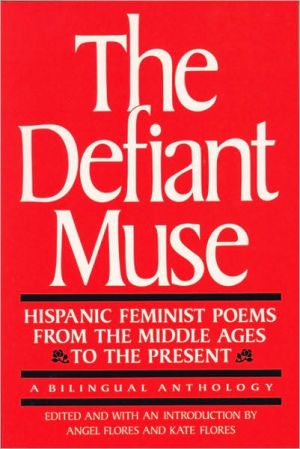The Defiant Muse: Hispanic Feminist Poems from the Mid: A Bilingual Anthology
Each bilingual volume in The Defiant Muse series includes 60 to 80 poems by both well-known and rediscovered poets, selected on the basis of their individual merit and as illustrations of the evolution of feminist thought and feeling.\ \ Reflecting their own cultural milieus as well as enduring themes, the poets write of love and friendship, revolution and peace, religion, nature, isolation, work, and family. The Dutch, French, German, and Italian volumes represent their respective...
Search in google:
Each bilingual volume in The Defiant Muse series includes 60 to 80 poems by both well-known and rediscovered poets, selected on the basis of their individual merit and as illustrations of the evolution of feminist thought and feeling. Reflecting their own cultural milieus as well as enduring themes, the poets write of love and friendship, revolution and peace, religion, nature, isolation, work, and family. The Dutch, French, German, and Italian volumes represent their respective countries; the Hispanic volume includes poems from the many Spanish-speaking nations; and the Hebrew volume encompasses writing in Hebrew from around the world. The poems are presented in their original languages alongside English translations. Each volume includes an introduction, placing the poetry in historical and aesthetic perspective, and full biographical and bibliographical notes on the poets.Library Journalea. vol: Feminist Pr. (Defiant Muse). 1986. poetry The Feminist Press has made a substantial contribution to literary history in this first-of-a-kind bilingual series of feminist poetry from the medieval period to the present. Numerous poems in the French anthology were written before the 19th century, and they reflect the classical and discursive nature of French poetry of that era. In this tradition are Constance-Marie de Salm-Dyck (1767-1845), who in her ``Letter to Women'' writes ``unjust man, craving to conquer all,/ Claims to subject us to the law of might''; and Marie de Romieu (1540s-1590), whose poem ``Brief Discourse: That Woman's Excellence Surpasses Man's'' praises female virtues. A more lyrical feminism is found in the Hispanic poetry, grounded in the female voice of early Spanish folk poetry as well as the oppressiveness of Hispanic Catholic culture. This background helps us understand an intensely passionate poem by Sor Juana (Mexico, 1640s-1695) ``What Interest Have You, World, in Persecuting Me?'' (``Wherein do I offend you, when all I want/ Is to give beauty to my mind/ And not my mind to beautiful things?''); and the lament of an anonymous nun from Alcala whose parents, ``as if enemies,'' have ``buried'' her in a convent. Volumes on German and Italian poems see below complete the series. Joyce Nower, Academic Skills Ctr., San Diego State Univ.
\ Library Journalea. vol: Feminist Pr. (Defiant Muse). 1986. poetry The Feminist Press has made a substantial contribution to literary history in this first-of-a-kind bilingual series of feminist poetry from the medieval period to the present. Numerous poems in the French anthology were written before the 19th century, and they reflect the classical and discursive nature of French poetry of that era. In this tradition are Constance-Marie de Salm-Dyck (1767-1845), who in her ``Letter to Women'' writes ``unjust man, craving to conquer all,/ Claims to subject us to the law of might''; and Marie de Romieu (1540s-1590), whose poem ``Brief Discourse: That Woman's Excellence Surpasses Man's'' praises female virtues. A more lyrical feminism is found in the Hispanic poetry, grounded in the female voice of early Spanish folk poetry as well as the oppressiveness of Hispanic Catholic culture. This background helps us understand an intensely passionate poem by Sor Juana (Mexico, 1640s-1695) ``What Interest Have You, World, in Persecuting Me?'' (``Wherein do I offend you, when all I want/ Is to give beauty to my mind/ And not my mind to beautiful things?''); and the lament of an anonymous nun from Alcala whose parents, ``as if enemies,'' have ``buried'' her in a convent. Volumes on German and Italian poems see below complete the series. Joyce Nower, Academic Skills Ctr., San Diego State Univ.\ \
